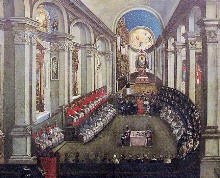
The Canons And Decrees Of The Council Of Trent
TOUCHING THE SACRAMENT OF MATRIMONY
CANON I. If any one shall say, that matrimony is not truly and properly one of the seven sacraments of the evangelic law, instituted by Christ the Lord; but that it has been invented by men in the Church, and that it does not confer grace; let him be anathema.
CANON II. If any one shall say, that it is lawful for Christians to have several wives at the same time, and that this is not prohibited by any divine law; let him be anathema.
CANON III. If any one shall say, that those degrees only of consanguinity and affinity, which are set down in Leviticus, can hinder matrimony from being contracted, and dissolve it when contracted; and that the Church cannot dispense in some of those degrees, or ordain that others may hinder and dissolve it; let him be anathema.
CANON IV. If any one shall say, that the Church could not constitute impediments dissolving marriage; or that she has erred in constituting them; let him be anathema.
CANON V. If any one shall say, that on account of heresy, or irksome cohabitation, or the intentional absence of one of the parties, the bond of matrimony may be dissolved; let him be anathema.
CANON VI. If any one shall say, that matrimony contracted, but not consummated, is not dissolved by the solemn profession of religion by one of the parties married; let him be anathema.
CANON VII. If any one shall say, that the Church doth err in that she hath taught, and doth teach, according to the evangelical and apostolic doctrine, that the bond of matrimony cannot be dissolved on account of the adultery of one of the married parties; and that both, or even the innocent party, who gave not occasion to the adultery, cannot contract another marriage during the lifetime of the other married person; and, that he is guilty of adultery, who, having put away the adulteress, shall marry another wife, as also she, who having put away the adulterer, shall wed another husband; let him be anathema.
CANON VIII. If any one shall say, that the Church errs, in that she decrees that, for many causes, a separation may take place between husband and wife, in regard of bed or cohabitation, for a determinate or for an indeterminate period; let him be anathema.
CANON IX. If any one shall say, that clerks constituted in sacred orders, or regulars, who have solemnly professed chastity, are able to contract marriage, and that being contracted, it is valid, the ecclesiastical law, or vow, notwithstanding; and that the contrary is nothing else than to condemn marriage; and, that all who do not feel that they have the gift of chastity, even though they have made a vow thereof, may contract marriage; let him be anathema: seeing that God denieth not that gift to them that ask it rightly, neither does He suffer us to be tempted above that we are able.
CANON X. If any one shall say, that the marriage state is to be preferred before a state of virginity, or of celibacy, and that it is not better and more blessed to remain in virginity, or in celibacy, than to be joined in matrimony; let him be anathema.
CANON XI. If any one shall say, that the prohibition of the solemnization of marriages at certain times of the year, is a tyrannical superstition, proceeding from the superstition of the heathen; or shall condemn the benedictions and other ceremonies of which the Church makes use therein; let him be anathema.
CANON XII. If any one shall say, that matrimonial causes do not concern ecclesiastical judges; let him be anathema.
Copyright ©1999-2023 Wildfire Fellowship, Inc all rights reserved

 Keep Site Running
Keep Site Running